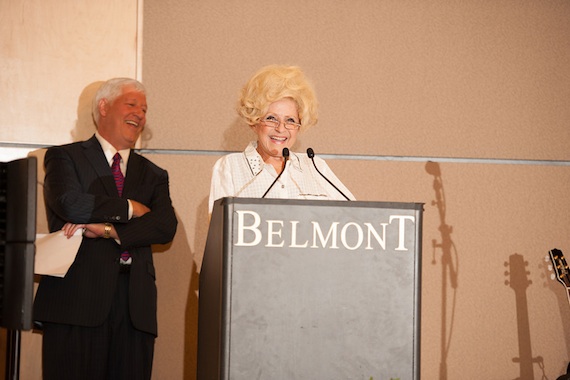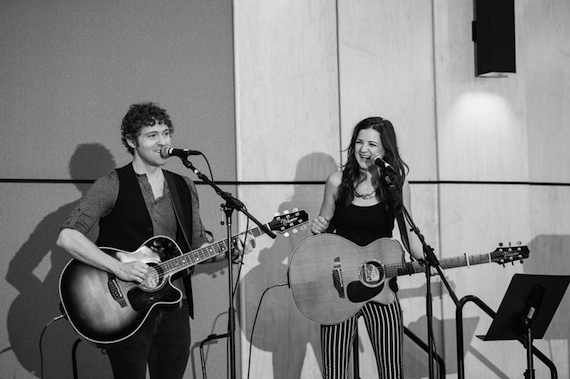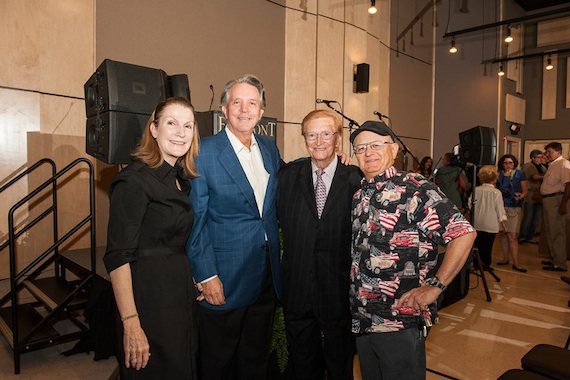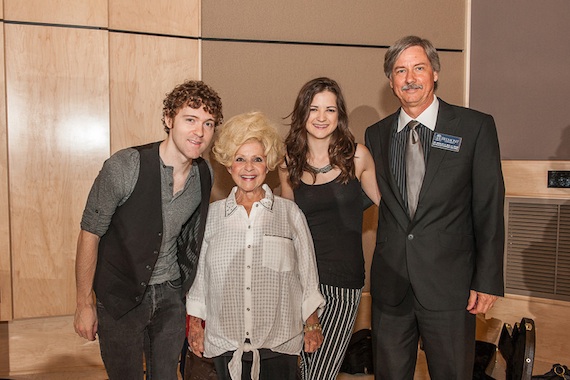

Pictured (L-R): Belmont President Bob Fisher and Brenda Lee.
Chapter 454
Thanks to the generosity of the Mike Curb Family Foundation, the students at Belmont University now have four vintage studios in which to learn the crafts of engineering and producing records.
The fourth of them, Columbia Studio A, was officially opened with a breakfast reception on Friday (May 9). It joins RCA Studio B, The Quonset Hut and Ocean Way, all of which have been previously restored by Curb.
“Our Curb College is now the largest stand-alone music-business program in the nation,” said Curb at the event. He recalled that when he was a kid in California, he marveled that so many hits could come from Studio B and the Quonset Hut, alone.
“What you did in this studio is beyond what any of us could dream,” he told the attendees, many of whom were veteran Nashville music figures. “While I’m alive, I want to see this happen again…..Thank you, thank you for building this and making it what it is. We’re just proud to be restoring it.”

Striking Matches’ Justin Davis and Sarah Zimmermann.
Striking Matches – Sarah Zimmermann and Justin Davis – met as Belmont students. The duo began the event by singing “She’s Got You,” which Patsy Cline recorded next door in The Quonset Hut.
“Striking Matches is literally on fire,” quipped Belmont president Bob Fisher. “Their presence today reflects the aura of this place – the past, the present and the future.” He recognized Harold Bradley, who created the original facility with his brother, the late Owen Bradley, in 1955. “Today we’re celebrating,” Fisher added. “Mike Curb has been the most active person in preserving Nashville’s recording history.”
Curb is leasing the studio to Belmont for the next 40 years, which Fisher said amounts to a $10 million behest. The Belmont chief introduced several denizens of Columbia Studio A who were in the crowd. In addition to Harold Bradley, they including Lou Bradley, Ron “Snake” Reynolds, Jerry Kennedy, Bill Walker, Wayne Moss, Dickie Lee, Laing Martine Jr., acoustic designer Dave Rochester, Hoot Hester, Jim Ed Norman and Word president Rod Riley.
“There’s a story for every one of you in this room,” Fisher said.
Charlie McCoy recalled playing the harmonica intro on Roy Orbison’s “Candy Man,” which kick-started his session career. He was later invited to New York to play on Bob Dylan’s “Desolation Row.”
“That was [producer] Bob Johnston’s way of luring Bob Dylan to Nashville,” McCoy recollected. Dylan block-booked Columbia Studio A to record Blonde on Blonde, writing its songs during the sessions. He returned to record John Wesley Harding and Nashville Skyline on Music Row as well. The result: “Nashville was certified as a recording center by people who would have never come here to record,” McCoy said.

Pictured (L-R): Linda Curb, Mike Curb, Harold Bradley and Charlie McCoy. Photo courtesy of Belmont University
Pop luminaries who have recorded in Columbia Studio A also include Leonard Cohen, The Byrds, Boz Scaggs, Simon & Garfunkel, Elvis Costello, Dan Fogelberg, REO Speedwagon and Manhattan Transfer.
“We have heroes in this town, and one of them is Mike Curb,” added McCoy. “I’m honored to be here. And I’m still playing, by the way!”
“This is a magical building for me,” said Brenda Lee. “Owen and Harold had a vision when they bought a house and built a studio. This little patch of ground where we stand was the foundation of the sound heard ‘round the world.”
“These walls can and will talk to a new generation. And for that, we can all be grateful.”

Pictured (L-R): Justin Davis, Brenda Lee, Sarah Zimmermann and Belmont’s Wes Bulla.
Striking Matches closed the reception with another performance. “We’re surrounded by music royalty,” Davis observed. “We’re honored and humbled. If you recognize any licks we play, it’s because we stole them all from you.”
It really was an A-list crowd. Schmoozing fabulons working the room included Troy Tomlinson, Buddy Miller, Mark Ford, Debbie Linn, Pat McMaken, Ronnie Shacklett, Alan Stoker, Pete Fisher, Michael Gray, Shelby Kennedy, Jeff Balding, David Wykoff and Belmont’s James Elliott, Wes Bulla, Don Cusic, Bo Thomas and studio manager Michael Janus.
Coffee, cookies and assorted breakfast items were served.



